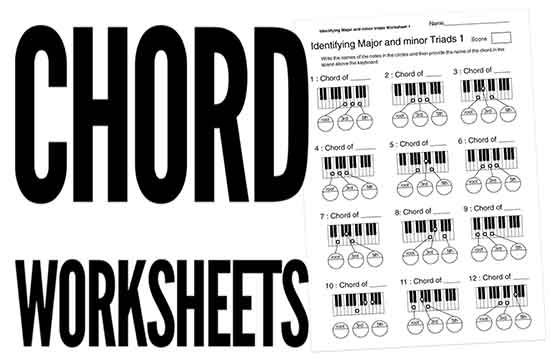
So far, the best ear training thing for me has been playing and singing aloud to the rule of the octave. You can probably make a lot of progress during that time, but one year give you some sense of the scope of the undertaking.

#EAR PRACTICE MAJOR AND.MINOR.CHORDS FULL#
In all seriousness think in terms of a full year. So the first thing to realize is you must be prepared to spend much, much more time on the ear training. One week is not enough time, unless you have amazingly sharp ears. but it happens gradually and you'll never be completely finished. You do the "Oh" part a few (hundred) thousand times then everything makes sense. If you know a piece uses a V7b9/V because you've analyzed it then you can listen to it and say "Oh, that is how it sounds". Listening to music is where you can apply these things. What is the V7b9/V in the key of D# major? Can you figure out the notes relatively quickly? What are the intervals of a F#13#11? What chord does a the notes A C Eb F# B want to resolve to? These are intellectual things that you learn by studying, it has nearly zero to do with sound. Sure, you probably can learn to hear these chords by practicing in some way but it will take you 10 times longer and you will get 100 times less out of it and that is not how you want to approach it. It mainly has to do with exposure both intellectually and aurally. You have to learn to see the simplicity of it. It really is very difficult on one hand but very simple on the other. Analyze music! All music is just chords, so it's pretty easy. The IV, well, it's right there, do you see it? You don't! That is why you don't know it is a IV chord. How many songs do you know that uses dominant 7th chords? If you don't know any songs then what is the point? If you know some songs then figure out the where the dominant 7th chords are and that is what they sound like. The biggest thing is to actually learn songs. Once I stopped wasting my time on trying to figure out shortcuts(which is what these "ear training" stuff is) and started working on actual music, after about 2 years I could ear almost all the chords. Now, I'm definitely not saying don't try to do what you are doing, just spend about 5 minutes a year on it, spend the rest of the time being more productive. Even if you do figure it out do you just want to be a one trick pony? Don't try to rush things, just learn and listen and over time things will make sense. You are simply not going to be able to figure it out through some abstract process of practicing to hear some type of chord out of context and meaning. Learn to count so you know where things are at then you will know. So you can hear what it sounds like there. The V7 chord comes at the 9th bar almost ALWAYS. Of course almost every piece of music uses dominants. Have you listened to much blues? BB King? SRV? Albert King? Blues is the sound of the "dominant". Listen to blues, you'll hear dominants all over the place. Don't try to hear some magical thing inside chords that doesn't exist).Ī dom 7th chord has a tension in it that sets it apart from all the other non dominant chords. Learn to spell chords and learn to analyze chords in music so you can at least know what you are suppose to hear, and then listen(= actively listen, which really means listening to a lot of different music. but you learn to tell them apart by contrasting them with other colors AND by knowing the names of what you are hearing. What makes them each unique is the unique combination of notes. All these are just different colors/sounds. Min Add 9th, Min add11, Maj add#11, Maj add6, Sus2/4, etc. But add a 4th note you get many more combinations. That is, you probably can tell major and minor apart, that is easy. You build up the picture progressively not by sequentially. You won't under understand this unless you learn triads, maj 7ths, minor chords, diminished, tensions etc. Dom7 chords have a certain quality to them. I used to think like you and I wasted many years, once I actually spent time learning music(listening and such) then everything made sense and I could hear everything I wanted.īut because you think it doesn't work this way: Every musical group of notes has a "color". The more you listen the more you'll figure out stuff.

Learn songs, learn to sight read, learn to improvise, etc.

Learning music automatically teaches you everything you want. Rather than focusing on some abstract idea to "detect" some type of chord your time is better spent learning music. You do realize there are all kinds of 7th chords? Not just your basics by 7b5, 7#11's, 9th chords(which are 7add9's), 7b9, etc?Ĭan you detect intervals? Triads? Qualities? Extensions? You do realize that it is more than just some "trick"? You have to spend many years in music to truly understand what is going on.


 0 kommentar(er)
0 kommentar(er)
